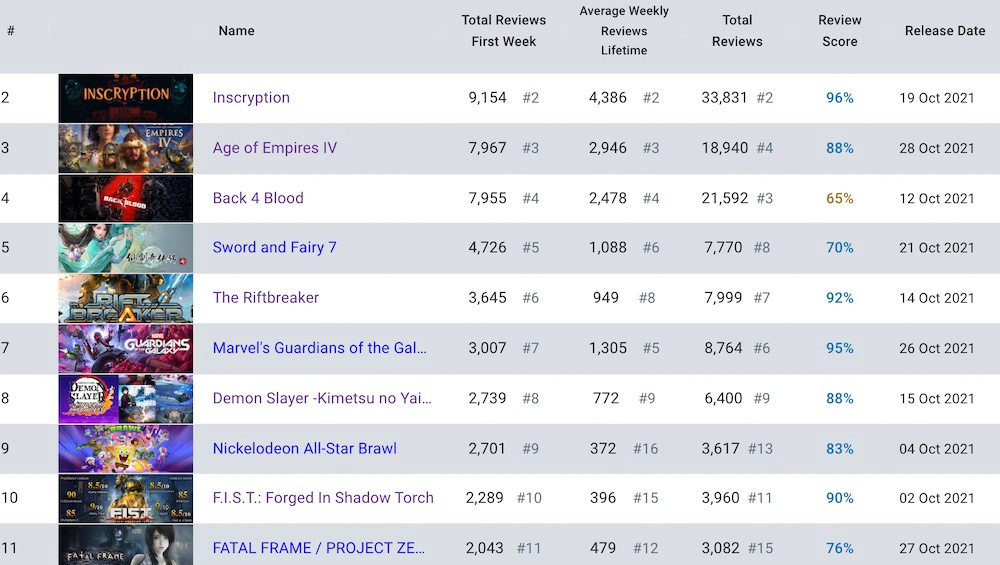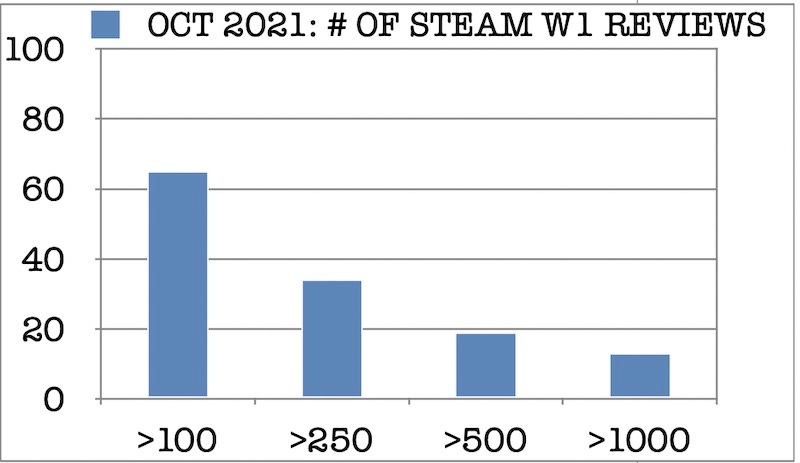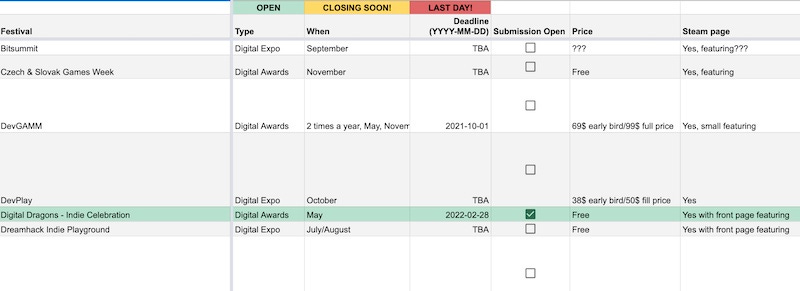Game devs: what's your chance of success in today's market?
Working out the chances of doing gud on Steam.
[The GameDiscoverCo game discovery newsletter is written by ‘how people find your game’ expert & GameDiscoverCo founder Simon Carless, and is a regular look at how people discover and buy video games in the 2020s.]
We’re almost there! Welcome to the final working week before the 2021 Xmas holidays kick in for most of us. And it’s rainy and damp here in Northern California, which makes a nice change from the regular semi-drought issues.
But up here on the information superhighway, data flows smoothly - no matter the moisture content of your clouds. (Wait, is that a ‘cloud computing’ joke? Not sure, but it is now!) So let’s get on and analyze a month of Steam launches for takeaways, eh?
[REMINDER: membership of our GameDiscoverCo Plus paid subscription costs only $12 a month if you sign up for a year. It includes an exclusive weekly Plus newsletter, an info-filled Discord, a data-exportable Hype back-end, two great eBooks, & lots more - hop aboard!]
Can we quantify chances of success on Steam?
So, we’re a little enchanted with our recently launched Steam post-release data (explained here & fully browsable for Plus subscribers!) And one thing is does help with is quantifying and comparing first week - and longer term - success by Steam review count.
So we thought we’d take a look at October 2021’s ‘brand new games launching on Steam’ - 964 in total. Above is the top 10 paid games by first week Steam review count - featuring hits like Inscryption, Back 4 Blood and The Riftbreaker. (The top-reviewed game, excluded because it’s F2P, is fast-follow Squid Game pastiche Crab Game.)
Because we’ve tracked the first week of reviews, no matter when the game launched, we can do things we haven’t seen done before. In particular, here are the number of games with certain thresholds of Steam Week 1 reviews for the month:
So, taking each of these four thresholds and commenting on them individually:
Out of 965 games released in October 2021, a total of 65 (around 6%) got more than 100 Steam user reviews in Week 1. And if we say that the reviews/sales ratio is around 40, then those games (in theory) sold at least 4,000 copies in their first week on sale.
However, only 34 of those new releases (around 3.5% of all releases) got more than 250 Week 1 user reviews in October. Those titles - very roughly - sold at least 10,000 units, not taking into account refunds - in their first week. (More on refunds and net/gross soon!)
Next step up? Around 19 of those games (around 2% of all releases) scored more than 500 Steam reviews in their first week on sale. Those folks sold at least 20,000 units just in their first week, if we go by rough median - pretty good going!
Finally, on the top end, 13 debut games - including some of the big hits pictured above, and around 1.5% of all Steam releases for the month - had more than 1,000 Steam reviews for the month. This implies a first-week sales total of 40,000 units or more.
We can go further - in the abstract - in trying to work out what this means for these games’ short and longer-term performance. Our incredibly rough spreadsheet from a recent newsletter shows those 65 games with at least a 4,000 unit Week 1 (at $15 average worldwide sales price) will get you $35,000 USD net after the end of the first week. This takes into account sales taxes, Steam cut, refunds, etc. That becomes $105,000 net at the end of Year 1, using some basic multipliers.
Extrapolating these numbers for the higher tiers: 34 of the new games in October 2021 will make $260,000 net or more in their first year, 19 will make $520,000+, and 13 will make $1.05 million+ - and many of those will make multiple millions, of course.
So there’s a whole bunch of ways to read this and start panicking/not panicking (above). And - please don’t panic! Here’s some thoughts from us on it:
Firstly, bear in mind that many of these titles cost a lot more - or a lot less - than $15 average worldwide sales price. Review to sales ratio can be as low as 1:20 and as a high as 1:60. So this really is hideously extrapolated. But it’s what we’ve currently got, and it’s better than nothing.
If you’re a new game entering this battlefield, you’ll find that the top spots can be full of existing IP or big licenses. Only 3 or 4 out of the top 13 games with >1,000 Week 1 reviews in October 2021 would be counted - in our book - as brand new original IP with no previous interest. (Less so with lower rankings.)
Finally, don’t forget that if you get an ‘evergreen’ title, you can sell incredibly well over time. And you can add free updates, paid DLC, perhaps IAP, and all kinds of things to boost revenue. Looking at Skul: The Hero Slayer and ignoring its ‘vote for me in the Steam Awards’ review boost, that game looks like it’s selling 25,000+ copies per month on Steam, nearly two years after launch.
But yes, unless you have a publisher paying for your game who is balancing risk across multiple titles, small self-published indie titles should probably not spend millions on making a game. (Unless you’re confident you can be one of the top couple of hundred new Steam titles in any given year, or can do very well across console revenue/subscription deals, of course.)
What this brief data crunch further convinced me is that the sweet spot, risk-wise, is definitely in the low hundreds of thousands of USD in this space. Whether it’s getting more risky is… something we’re going to try to evaluate over time. And look - it’s not easy to succeed with higher-budget titles. But it’s still definitely possible.
Steam custom sales - how do you ever keep up?
Here’s one tricky thing - which is also cool - about the decentralized nature of Steam sales/festivals. It’s cool that they’re run by a whole load of interesting third parties, all of which have their own entry criteria and rules and bring some interesting flavor. But how do you find out about them all?
We’ve previously mentioned the ‘all sales history’ page on SteamDB, which is really useful to browse. However it also includes a lot of publisher-specific sales which you clearly can’t get into if you’re not being published by the company in question. (And is also backward-looking.)
A new solution is from Artur Karpinski (Jupiter Moons: Mecha), who’s created this Google spreadsheet with a full list of third-party festival/sales, possible deadlines for applications, and more. There’s a second tab where you can contribute sales that he might have missed, and he’ll check them and flow them onto the main document.
It’s possible that some of the Steam sales/festival etiquette could change in 2022 - we’ve heard rumblings that genre-themed sales may be dealt with differently. But whatever happens, good tracking of these opportunities is vital! So it’s good to see a centralized resource.
(Thx to Chris Z for pointing Artur’s spreadsheet out in a recent newsletter - we’d missed it before then!)
The game discovery news round-up..
OK, we have just a few hours of daylight left, and a whole bunch of interesting links to disgorge to all you good readers. So let’s get on it, before we’re left hunched over our writing desk, sharpening our quill by moonlight:
Some more ‘top games of the year called 2021’ round-ups are in, and I recommend them - The New Yorker takes a fairly indie/art-centric approach to the medium, GameSpot has an interesting Top 10, actually, and Polygon’s Top 50 is a lot of fun to scroll through, too.
NPD U.S. console/game sales results are out, and the main takeaway is that consoles are having a rough time, supply-wise. Daniel Ahmad notes: “If you want to know how bad the supply situation is: The Switch sold less than November last year ; PS5 + Xbox barely = what Switch sold in total ; The PS4, XB1 and Wii U (yes Wii U) sold more in Nov 2014 than Switch + PS5 + Xbox Series in Nov 2021.” Wot.
Microlinks, Pt.1: Nintendo loses a court case over eShop pre-order restrictions after a successful appeal by German consumer rights group; have to admit I was surprised to see a Ludo game on the most-downloaded mobile games of November 2021 (it’s massive in India!); posh consulting company Deloitte has some views on the future of consoles after 50 (!) years.
Look, the Epic Games Store has a cart now - see above logo, which I swear looks like a grandmother who forgot to put her false teeth in. Also notable: “You may have also noticed the MOVE TO WISHLIST function within the cart. If you’re not sure about purchasing an item, just move it over to your wishlist and keep an eye out for discount notifications! Please remember to opt-in to our email communications via account settings to stay updated on items from your wishlist.”
In case you missed The Game Awards (and I’m sure you didn’t!), Polygon has a good round-up of all the announcements and new trailers. Can’t believe that games called ‘Slitterhead’ and ‘Forspoken’ were both shown. (But look, there was a famous pop group called Bananarama once, so anything is possible.)
Microlinks, Pt. 2: the top Steam sellers for the week are headed by Halo, Destiny 2, and Icarus, definitely all ‘certain types’ of game; the v.useful Family Video Game Database has partnered with PlayStation; how many wishlists can you expect when you launch your Steam game’s ‘coming soon’ page?
A big yes to this Chris Charla (ID@Xbox) Tweet: “On Xbox as players scroll through the new releases, your trailer will start to play. I would gently suggest that this may not the place to have a long, slow, cinematic start to your trailer that takes 45 seconds to get through the logos slowly fading in and out.. instead consider a trailer cut for your game details' page that gets to gameplay in about a second.”
Some late-breaking Epic vs. Apple lawsuit documents (more on this subject on Wednesday!) showed that: “Microsoft quietly told Apple it was willing to turn big Xbox-exclusive games into iPhone apps.” This is a complex and well-reported story: “Microsoft now tells The Verge that Apple was actually the one that rejected its proposals - because Apple insisted on forcing each and every game to include the full streaming stack.”
Microlinks, bad PR edition: the backlash didn’t catch them unawares, ‘cos Ubisoft’s NFT video was unlisted in the first place, folks; Roblox is giving a masterclass in the Streisand Effect by vaguely intimidating People Make Games, leading to an even better follow-up video; Mark Zuckerberg tries to level up by associating himself with noted pill-popper Pac-Man. (It’s kinda cool, actually.)
And finally, leave it to Double Fine’s Tim Schafer to discover the ‘secret dirt’ behind the scenes - as The Game Awards gave out awards to swearing people and non-swearing people alike:
[We’re GameDiscoverCo, a new agency based around one simple issue: how do players find, buy and enjoy your premium PC or console game? We run the newsletter you’re reading, and provide consulting services for publishers, funds, and other smart game industry folks.]






